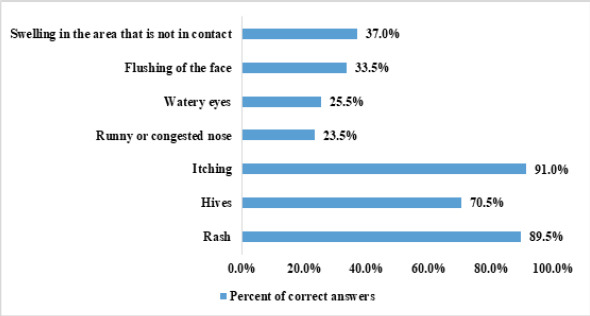Assessment of Jordanian pharmacists' knowledge and perception regarding sexual and reproductive health and their practice in providing sexual counseling to patients.
IF 1
Q3 PHARMACOLOGY & PHARMACY
Pharmacy Practice-Granada
Pub Date : 2023-01-01
Epub Date: 2023-02-08
DOI:10.18549/PharmPract.2023.1.2792
引用次数: 0
Abstract
Objective: In this quantitative study, we intended to explore sexual/ reproductive counseling between Jordanian pharmacists by addressing pharmacists’ knowledge regarding sexual/ reproductive health and their perception and practice in providing counseling to patients. Method: This study adopted a survey methodology using a self-completed validated and administered unnamed survey. Participants were asked to fill-out the electronic survey after providing their electronic consent. Social media was utilized to extend the survey to facilitate contact multiple parts of pharmacists’ community. Results: In this study, 200 pharmacists agreed to participate in this study. Most of the pharmacists knew that depression (n= 182, 91%) and alcohol (n=171, 85.5%) were among the main factors that my decrease sexual performance. Also, only 38.5% of the pharmacists (n= 77) agreed that discussing sexual issues is the responsibility pf pharmacists, and only 55% of them (n= 110) felt comfortable discussing patients’ sexual matters as any medical issue. Moreover, more than two-third of the pharmacist (n= 146, 73%) reported that if they were consulted about sexual problem, they may explore patients’ problem. On the other side, only half of pharmacists (n= 102, 51%) revealed that they may discuss the side effects of prescribed drug if it might affect sexual performance. Conclusion: Education on sexuality/ reproduction is the key to help Jordanian pharmacists to advance patients’ sexual/ reproductive health. In general, research on sexual/ reproductive health in conservative societies is limited. Therefore, additional surveys that include the perspectives of both patients and pharmacists on sexuality/ reproduction to augment this normally ignored aspect of health are necessary.

评估约旦药剂师对性健康和生殖健康的知识和看法,以及他们为患者提供性咨询的做法。
目的:在这项定量研究中,我们旨在探讨约旦药剂师之间的性/生殖咨询,通过了解药剂师对性/生殖健康的知识,以及他们在为患者提供咨询时的感知和实践。方法:本研究采用了一种调查方法,使用了一项自行完成的、经过验证和管理的未命名调查。参与者被要求在提供电子同意书后填写电子调查。利用社交媒体扩大了调查范围,以方便药剂师社区的多个部门联系。结果:在本研究中,200名药剂师同意参与本研究。大多数药剂师都知道抑郁症(n=18291%)和酒精(n=17185.5%)是我性表现下降的主要因素。此外,只有38.5%的药剂师(n=77)同意讨论性问题是药剂师的责任,只有55%的药剂师(n=110)认为将患者的性问题作为任何医疗问题来讨论是舒服的。此外,超过三分之二的药剂师(n=146,73%)报告说,如果就性问题咨询他们,他们可能会探究患者的问题。另一方面,只有一半的药剂师(n=102,51%)透露,如果处方药可能影响性行为,他们可能会讨论处方药的副作用。结论:性/生殖教育是帮助约旦药剂师提高患者性/生殖健康的关键。一般来说,保守社会对性健康/生殖健康的研究是有限的。因此,有必要进行额外的调查,包括患者和药剂师对性/生殖的看法,以加强这一通常被忽视的健康方面。
本文章由计算机程序翻译,如有差异,请以英文原文为准。
求助全文
约1分钟内获得全文
求助全文
来源期刊

Pharmacy Practice-Granada
PHARMACOLOGY & PHARMACY-
CiteScore
3.90
自引率
4.00%
发文量
113
审稿时长
20 weeks
期刊介绍:
Pharmacy Practice is a free full-text peer-reviewed journal with a scope on pharmacy practice. Pharmacy Practice is published quarterly. Pharmacy Practice does not charge and will never charge any publication fee or article processing charge (APC) to the authors. The current and future absence of any article processing charges (APCs) is signed in the MoU with the Center for Pharmacy Practice Innovation (CPPI) at Virginia Commonwealth University (VCU) School of Pharmacy. Pharmacy Practice is the consequence of the efforts of a number of colleagues from different Universities who belief in collaborative publishing: no one pays, no one receives. Although focusing on the practice of pharmacy, Pharmacy Practice covers a wide range of pharmacy activities, among them and not being comprehensive, clinical pharmacy, pharmaceutical care, social pharmacy, pharmacy education, process and outcome research, health promotion and education, health informatics, pharmacoepidemiology, etc.
 求助内容:
求助内容: 应助结果提醒方式:
应助结果提醒方式:


